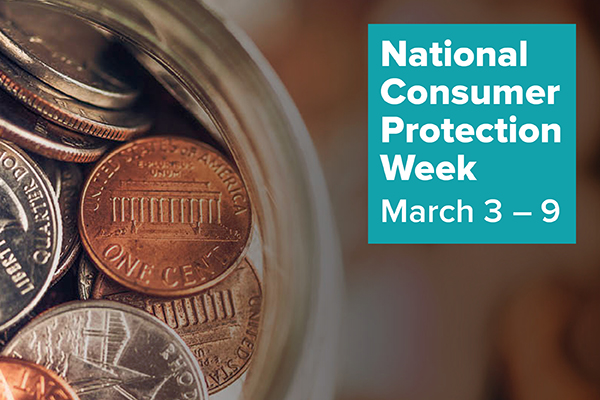National Consumer Protection Week (NCPW) is March 3-9, 2019. Sponsored by the Federal Trade Commission (FTC), the week aims to draw attention to information, resources, and organizations available to consumers to help protect them from fraud and unfair business practices. At JAN, we regularly hear from customers who have located a particular “work-at-home” business opportunity or grant advertisement that they would like to investigate further. It might sound too good to be true or perhaps is in some way raising red flags. When we as consumers suspect these red flags or experience that gut feeling something is off, this is a good thing. It prompts us to be cautious and dig deeper. While fraud and deception in economic practices is not new, the Internet has raised these concerns to an entirely new level. As consumers, it’s important for us to know what organizations and resources are out there to inform and protect us, and that’s what NCPW Week sets out to do — educate!
On JAN’s self-employment team, we frequently share with our customers consumer protection information — particularly resources available from the FTC.
So what do they do?
“The FTC is the only federal agency with both consumer protection and competition jurisdiction in broad sectors of the economy. The FTC pursues vigorous and effective law enforcement; advances consumers’ interests by sharing its expertise with federal and state legislatures and U.S. and international government agencies; develops policy and research tools through hearings, workshops, and conferences; and creates practical and plain-language educational programs for consumers and businesses in a global marketplace with constantly changing technologies.”
While the FTC has jurisdiction over a variety of areas, the main resources we share have to do consumer protection — working from home; business opportunities; credit and loans; and avoiding scams.
Here are a few sections we frequently share that may be helpful:
Working from Home — This includes information on medical billing businesses; envelope stuffing schemes; and invention promotions, to name a few. We probably share their publication on Work-at-Home Businesses the most. They write:
“When money’s tight, a work-at-home opportunity might sound like just the thing to make ends meet. Some even promise a refund if you don’t succeed.
But the reality is many of these jobs are scams. You end up paying for starter kits or certifications that are useless, find your credit card is charged without your permission, or get caught up in a fake check scam.
Other work-at-home offers just don’t deliver on their promises. The ads don’t tell you that you may have to work a lot of hours without pay, or don’t disclose all the costs up-front. You might spend money based on promises you’ll quickly earn it back — but you don’t. People tricked by work-at-home ads have lost thousands of dollars, not to mention their time and energy.”
Investments and Grants — This section includes information on topics such as government grant scams and business opportunity seminars. We often hear about misinformation having to do with “free money” or supposed “government grants” for people to start a business. These type of issues are discussed in their article Government Grant Scams.
JAN also hears from individuals who are in the process of repairing their credit profile in anticipation of starting a business. In their section on Credit and Loans, they offer a variety of articles on topics such as understanding credit reports; disputing errors on a credit report; awareness of payday loans; and using credit responsibly. They also highlight Credit Repair Scams.
Another source of excellent consumer protection information is from State Attorneys General Offices. The National Association of Attorneys General provides links to these offices in each state. While every agency has different priorities, most have a designated consumer protection section that provides information and resources. For example in Massachusetts, this unit is called the Consumer Advocacy & Response Division. Similar to the FTC, they offer consumer information, support, and the ability to file a complaint.
While these topics are anxiety producing for most of us, it’s much better to be aware and prepared!
For additional information about consumer protection and financial resources:
- USA.gov — State Consumer Protection Offices
- U.S. Department of Justice — Consumer Information
- Consumer Financial Protection Bureau (CFPB)
- CFPB — Your Money, Your Goals - Focus on People with Disabilities: A Companion Guide to Empower the Disability Community
- Military Consumer — Your Tool for Financial Readiness
- Better Business Bureau









